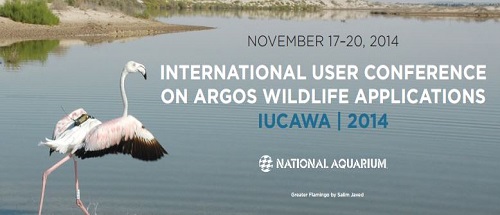← Back
Day 3 IUCAWA 2014

Scientists reported on the impact of climate change on Magellanic penguins in Punto Tomba, Argentina, on Emperor Penguins in the Southern Atlantic ocean, on polar bears and walruses in the Arctic, and on what lower oxygen levels in the Atlantic Ocean (as predicted by the International Panel on Climate Change) will do to tuna populations.
The afternoon presentations included sharing best practices for Argos tracking, exchanging ideas on how Argos must evolve to keep pace with the demands of biologists and rich discussions with a panel that included Richard Spinrad, Chief Scientist, NOAA, and Eric Schwaab, Chief Conservation Officer of the National Aquarium, among others, on how to sustain the future of Argos tracking.
IUCAWA was a unique event, bringing together scientists from diverse backgrounds, with a wide range of research interests, specializing in all taxa and species, from countries around the world. The scientists were genuinely pleased to share their research with each other, and the passion they have for their work was contagious. Major messages that came across were the universal concern these scientists have for our planet, and how essential the Argos system is to their discoveries, and to making the case for implementing conservation measures.
Highlights
Dee Boersma, of the University of Washington, has used Argos to track 568 Magellanic penguins from the largest colony in the world in Punto Tomba, Argentina. These penguins have the longest migratory patterns of any flightless birds, from Punto Tomba to Rio de Janeiro, Brazil (over 2,000 km round trip). Over the nearly 20 years that Dr. Boersma has been studying them, they have had to travel ever further to find food (due to climate change and competition with fishermen), leading to mortality rates of nearly 40% among the chicks. With Argos data, Dr. Boersma has identified a zone to establish a Marine Protected Area (MPA), where fishing should be banned entirely for 2 months while the chicks are young in order to preserve this population. Discussions are currently underway with the Argentinean government.
To learn more :
Since 2004, the USGS Alaska Science Center has tracked 467 walruses with Argos, and since 1985, over 500 polar bears have been tracked. These Argos data are used for modeling with environmental covariants. These studies show the alarming rate at which sea-ice is disappearing in the Arctic, leaving smaller, less suitable habitat areas for these two species, as George Durner, of the USGS Alaska Science Center, explained at IUCAWA 2014.
To learn more about polar bear-tracking
To learn more about walrus tracking
Less oxygen in the global oceans? How will tuna react? Kevin Weng, of the Virginia Institute of Marine Science, College of William and Mary, explains that if IPCC predictions prove to be true, the ocean of the future may be less friendly to tuna. Combining data from a variety of sources, including Argos tracking data and physiological data, Kevin Weng and his team point out that beyond over-fishing, other challenges lie ahead for the emblematic tuna species.
“Without Argos, we wouldn’t know about the direct link between foraging distance and reproductive success rate in Magellanic penguins.” Dee Boersma, University of Washington
“It’s amazing to see how Argos data allows us to see how animals use these areas and may possibly react to climate change.” Helen Bailey, University of Maryland, Environmental Science Center
“Fishery-independent Argos pop-up satellite tags have been an incredible tool for us, because you don’t have to catch the fish to learn where it went.” Molly Lutcavage, University of Massachusetts, Amherst
“IUCAWA: It’s nice to bring so many people together that all track wildlife from so many different species and so many different places in the world.” Gwen Lockhart, Virginia Aquarium
“I marvel at all the creativeness of biologists to go out there and tag animals. It’s hard work.” Dave Douglas, USGS
“It’s all the dialogue and striving for improvement: that’s what the Argos system is.” Dave Douglas, USGS
